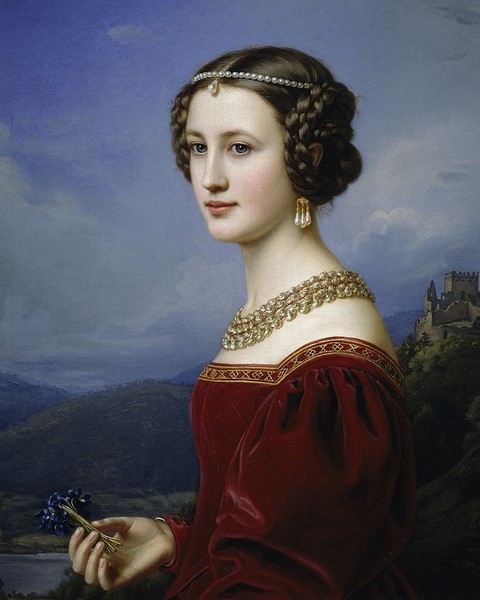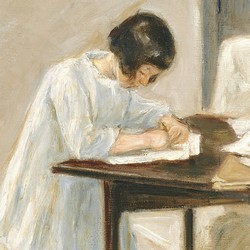
Networking: An extended group of people with similar interests or concerns who interact and remain in informal contact for mutual assistance or support. The activity of meeting people who might be useful to know, especially in your job.
We think that the networking is a very recent thing, but the thing is that it's something very old. Each of us had someone who gave us a helping hand, and each of us helped someone; so did our parents, and our grandparents, and we can go back as many generations as you want.
Josephine Lang, la nostra protagonista d'avui, va ser afortunada en aquest sentit. Va néixer a Munic el 1815, filla de músics; els seus pares, violinista ell i cantant ella, treballaven a l'òpera de la cort. Va ser la mare qui li va donar la primera formació musical, i molt aviat es va veure que els dots musicals de la nena eren extraordinaris: va compondre les seves primeres peces als cinc anys i als onze debutava en públic, alhora que començava a impartir classes de piano, que devia ser una cosa de veure.
Josephine Lang, our composer today, was fortunate in this regard. She was born in Munich in 1815, in a family of musicians; her parents, a violinist and a singer, were members of the court opera. Shortly after her mother began giving her piano lessons, it became clear that the child had an extraordinary musical gift: she composed her first pieces at five and gave her first concert at eleven, while also beginning to teach piano.
The child's godfather was Joseph Stieler, the court painter. Maybe you're not familiar with his name, but every music lover knows a portrait of Beethoven with the score of the Missa Solemnis in his hands and a red handkerchief around his neck; that's a work by Stieler. The painter used to open his home to intellectuals and artists, and the young Josephine used to join those meetings, especially after her mother's death in 1827. This is how she first met in 1830 someone who would become a friend for life and the godfather to his eldest son: Felix Mendelssohn. The young man, who was then a twenty-one-old famous musician, got stunned by Josephine's talent; shortly afterwards, he would write to his family: "She has the gift of composing songs and singing them as I have never heard before. It is the most complete musical joy I have ever experienced."
Mendelssohn did not succeed in convincing her father to let her go to Berlin, where she would have the best musical training (Josephine was an almost self-taught composer), but he did manage that her first song collection was published. This was the beginning of the career of Josephine Lang, a well-known and appreciated composer and performer during the 1830s, when she wrote many lieder and piano pieces. One of her friends was Stephen Heller, her own age, also a well-known pianist and composer who was virtually forgotten after his death, who has a place in this story because he was friends with Robert Schumann. When Josephine learned of this friendship, she begged Heller to send him some of her works; Schumann had founded in 1834 the Neue Zeitschrift für Musik and, if he would like her songs, he could publish a review or even some of them in the magazine.
In fact, Schumann already knew Lang; he was very aware of the current music, and by 1835 he had reviewed some of her songs, which he had not particularly liked. Heller sent him some pieces in 1837 and didn't get any satisfactory answer from Schumann; he insisted with some more songs in 1838, and that time he caught Schumann's attention. He was happy with the composer's evolution, and admitted that her style had grown in charm and tenderness. After some edition, he published in the magazine one of the songs, Das Traumbild, which he defined as delightful, along with a brief review that recommended "to the reader's attentive inspection".
I'll tell you in another article about how Josephine Lang needed again his friends to get ahead some years later, but now I'm focusing on that song, Das Traumbild. According to the many surviving drafts, the composer worked hard on the score before finishing it in 1834; she didn't go over it until 1861, when Tobias Haslinger agreed to publish it (along with another lied, it would be her Opus 28). In that review, she didn't directly apply the changes made by Schumann, but it seems that she took them into account; the most obvious change she made was the addition of a cello obbligato, probably thinking on the taste of her potential buyers. Whatever the reason, we won't be able to appreciate the effect, because the two recordings of Das Traumbild I know don't include the cello.
Lang's poem is by Heinrich Heine, from his Buch der Lieder; it's included in the third part, Der Heimkehr, only two poems after one that Schumann put into music in 1840, Du bist wie eine Blume. As in so many poems by Heine that we know through songs, he tells us about his dreams (literally, not only about his wishes). Also, as in so many poems, we find an ironic detail: he tells us that he lies surrounded by night... and by pillows (let's suffer, but with comfort); by the way, Mendelssohn suppressed those pillows when composing the duo Abendlied, from the same poem. However, it was Josephine who first put the poem into music, and I would say that with more personality; I would keep for Mendelssohn's setting the adjective "delightful", dedicated by Schumann to Das Traumbild.
I hope you like the debut of this composer onLiederabend; the performers of Das Traumbild are Jan Kobow and Cord Garben.
Wenn ich auf dem Lager liege
In Nacht und Kissen gehüllt,
So schwebt mir vor ein süßes,
Anmutig liebes Bild!
Wenn mir der stille Schlummer
Geschlossen die Augen kaum,
So schleicht das liebe Bild
Hinein in meinen Traum
Und mit dem Traum des Morgens
Zerrinnt es nimmermehr;
Dann trag' ich es im Herzen
Den ganzen Tag umher.
When I lie on my bed
Shrouded in night and pillows,
There floats before me,
A graceful, lovely image!
When quiet slumber
Has barely closed my eyes,
The dear image creeps
Into my dream!
And with the dream of the morning
It no longer dissolves:
I carry it around in my heart
All day long.
(translation by Aisling Kenny)



 The...
The... The Kin...
The Kin...










